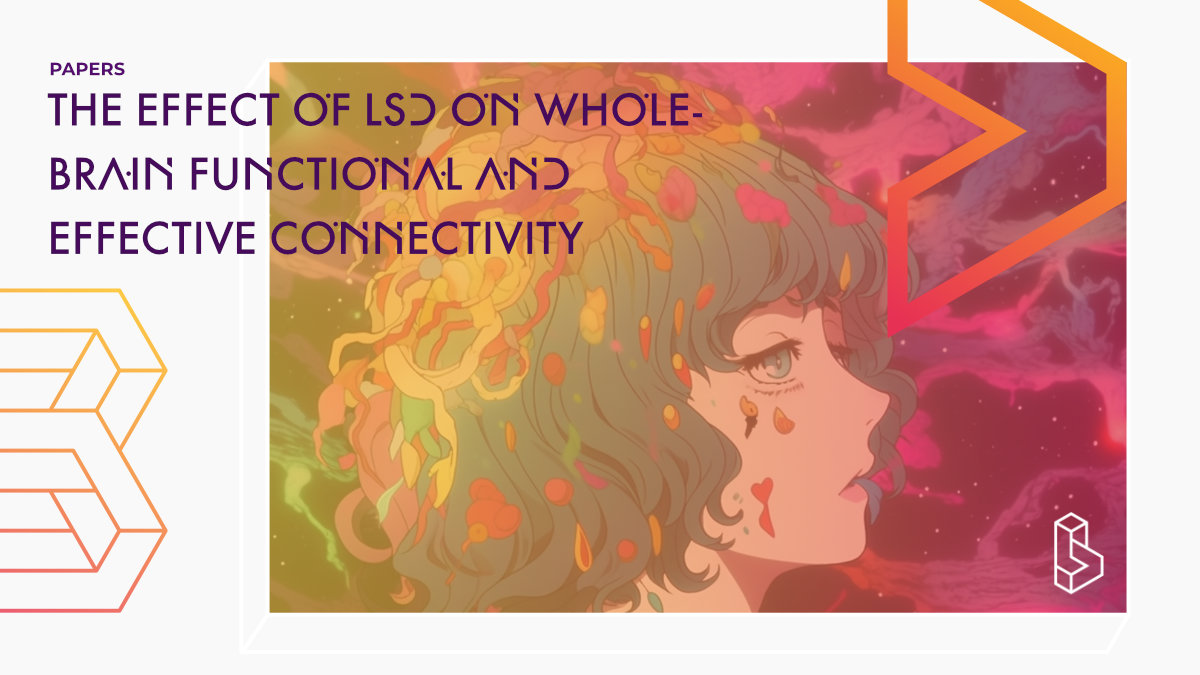This brain modelling study used data from two double-blind, randomized controlled trials to model whole-brain effective connectivity (EC) data and compare it to the previously reported functional connectivity (FC) data gathered following LSD administration. LSD decreased brain connectivity and increased self-inhibition in certain brain regions. EC and FC offer promise as clinically-relevant biomarkers for LSD effects.
Abstract
“Psychedelics have emerged as promising candidate treatments for various psychiatric conditions, and given their clinical potential, there is a need to identify biomarkers that underlie their effects. Here, we investigate the neural mechanisms of lysergic acid diethylamide (LSD) using regression dynamic causal modelling (rDCM), a novel technique that assesses whole-brain effective connectivity (EC) during resting-state functional magnetic resonance imaging (fMRI). We modelled data from two randomized, placebo-controlled, double-blind, cross-over trials, in which 45 participants were administered 100μg LSD and placebo in two resting-state fMRI sessions. We compared EC against whole-brain functional connectivity (FC) using classical statistics and machine learning methods. Multivariate analyses of EC parameters revealed widespread increases in interregional connectivity and reduced self-inhibition under LSD compared to placebo, with the notable exception of primarily decreased interregional connectivity and increased self-inhibition in occipital brain regions. This finding suggests that LSD perturbs the Excitation/Inhibition balance of the brain. Moreover, random forests classified LSD vs. placebo states based on FC and EC with comparably high accuracy (FC: 85.56%, EC: 91.11%) suggesting that both EC and FC are promising candidates for clinically-relevant biomarkers of LSD effects.”
Authors: Peter Bedford, Daniel J. Hauke, Zheng Wang, Volker Roth, Monika Nagy-Huber, Frederike Holze, Laura Ley, Patrick Vizeli, Matthias E. Liechti, Stefan Borgwardt, Felix Muller & Andrea O. Diaconescu
Summary of The effect of (LSD) on whole-brain functional and effective connectivity
Psychedelics like psilocybin and LSD have emerged as promising new treatment candidates for various psychiatric conditions, including alcohol and tobacco dependence, major depression and anxiety disorders. We used computational modelling and machine learning to evaluate the potential for individual-level predictions.
Functional connectivity (FC) and effective connectivity (EC) have already shown promise in uncovering the neural mechanisms underlying LSD, but FC is limited in its interpretability. EC is a more robust connectivity measure, while FC is more widely used.
Find this paper
The effect of lysergic acid diethylamide (LSD) on whole-brain functional and effective connectivity
https://doi.org/10.1101/2022.11.01.514687
Open Access | Google Scholar | Backup | 🕊
Study details
Compounds studied
LSD
Topics studied
Neuroscience
Study characteristics
Original Re-analysis
Placebo-Controlled
Double-Blind
Randomized
Re-analysis
Participants
48
Humans
Authors
Authors associated with this publication with profiles on Blossom
Matthias LiechtiMatthias Emanuel Liechti is the research group leader at the Liechti Lab at the University of Basel.
Institutes
Institutes associated with this publication
University of TorontoThe University of Toronto has established the Psychedelic Studies Research Program.
University of Basel
The University of Basel Department of Biomedicine hosts the Liechti Lab research group, headed by Matthias Liechti.
Compound Details
The psychedelics given at which dose and how many times
LSD 100 μg | 1xLinked Research Papers
Notable research papers that build on or are influenced by this paper
LSD acutely impairs fear recognition and enhances emotional empathy and socialityThis double-blind placebo-controlled study (n=40) found that LSD (100-200 μg) enhanced emotional empathy and sociality, but decreased recognition of sad/fearful faces (fear cognition).
Distinct acute effects of LSD, MDMA, and D-amphetamine in healthy subjects
This placebo-controlled, randomized, double-blind, cross-over study (n=28) investigated distinct acute autonomic, subjective, and endocrine effects of single doses of LSD (0.1 mg), MDMA (125 mg), D-amphetamine (40 mg) in healthy subjects. The results show that LSD, MDMA and D-amphetamine had different ratings on the 5 Dimensions of Altered States of Consciousness scale (5DASC) and Mystical Experience Questionnaire (MEQ). It also clearly indicates the distinct neurological and behavioral profiles of LSD, MDMA and D-amphetamine.

